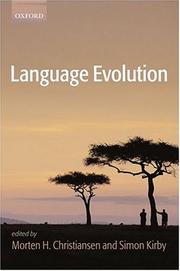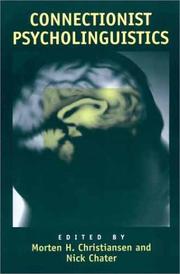| Listing 1 - 10 of 10 |
Sort by
|

ISBN: 0199244847 0199244839 0191715166 9780199244843 Year: 2003 Publisher: Oxford Oxford University Press
Abstract | Keywords | Export | Availability | Bookmark
 Loading...
Loading...Choose an application
- Reference Manager
- EndNote
- RefWorks (Direct export to RefWorks)
Philosophy of language --- Historical linguistics --- Linguistic change --- Language and languages --- Anthropological linguistics --- Origin --- Anthropological linguistics. --- Historical linguistics. --- Linguistic change. --- Origin. --- Change, Linguistic --- Language change --- Origin of languages --- Speech --- Diachronic linguistics --- Dynamic linguistics --- Evolutionary linguistics --- Language and history --- Linguistics --- Anthropo-linguistics --- Ethnolinguistics --- Language and ethnicity --- Linguistic anthropology --- Linguistics and anthropology --- Anthropology --- Language and culture --- History --- Language and languages - Origin
Book
ISBN: 0262334771 026203431X 9780262334778 9780262034319 026233478X 9780262535113 0262535114 Year: 2016 Publisher: Cambridge The MIT Press
Abstract | Keywords | Export | Availability | Bookmark
 Loading...
Loading...Choose an application
- Reference Manager
- EndNote
- RefWorks (Direct export to RefWorks)
A work that reveals the profound links between the evolution, acquisition, and processing of language, and proposes a new integrative framework for the language sciences.
Creativity (Linguistics) --- Language acquisition. --- Cognition. --- Psycholinguistics. --- Creative ability (Linguistics) --- Linguistic creativity --- Language, Psychology of --- Language and languages --- Psychology of language --- Speech --- Acquisition of language --- Developmental linguistics --- Developmental psycholinguistics --- Language development in children --- Psycholinguistics, Developmental --- Psychological aspects --- Psychology --- Acquisition --- Competence and performance (Linguistics) --- Linguistics --- Psycholinguistics --- Thought and thinking --- Interpersonal communication in children --- COGNITIVE SCIENCES/General --- LINGUISTICS & LANGUAGE/General --- Cognitive psychology
Book
Year: 2016 Publisher: Cambridge, MA : The MIT Press,
Abstract | Keywords | Export | Availability | Bookmark
 Loading...
Loading...Choose an application
- Reference Manager
- EndNote
- RefWorks (Direct export to RefWorks)
Cognition. --- Cognition. --- Creativity (Linguistics). --- Creativity (Linguistics). --- Language acquisition. --- Language acquisition. --- Psycholinguistics. --- Psycholinguistics. --- Spracherwerb.
Book
ISBN: 9781541674981 Year: 2022 Publisher: New York : Basic Books,
Abstract | Keywords | Export | Availability | Bookmark
 Loading...
Loading...Choose an application
- Reference Manager
- EndNote
- RefWorks (Direct export to RefWorks)
"Think about the game charades. Its rules are simple: no talking, of course, and little else. Each time we play with a new group, we have to figure each other out, with our different styles, backgrounds, and senses of the world, as we struggle to connect how we would act out something (say, Christopher Columbus crossing the Atlantic) with how other people might understand it. But as we play, a lingo can develop-with time, an upheld hand, bobbing along, might not just come to represent the ship on the Santa Maria, but a vast range of possibilities, including both conceptual ones such as exploration or trade, actions like sailing, or even a place like India or Santo Domingo. Almost from nothing, the players can create something like a language. Such nearly rule-less games are a hallmark of the human species: testament not just to our intelligence, but our flexibility of mind as well as our desires to cooperate, to understand, and to be understood. And with that as the point of departure, they are able to find compelling solutions to old riddles and new puzzles, including why chimpanzees don't understand pointing fingers; whether having two words for "blue" changes what we see; why Danish is so much harder to learn than Norwegian; how words change meanings; and whether computers will ever truly understand a human. The Language Game will bewitch readers of classic books on mind and language, such as Douglas Hofstadter's Godel Escher Bach and John McWhorter's The Power of Babel, and find a welcome spot on the shelf of readers of Joseph Henrich's Weirdest People in the World and Frans de Waal's Mama's Last Hug. And like the game of charades, it will engage, amuse, and dazzle readers for years to come"-- In The Language Game, cognitive scientists Nick Chater and Morten Christiansen show games like charades reveal something more: where language comes from and how it works. Language is perhaps humanity's most astonishing traits, and one of its most studied, but as Chater and Christiansen, it has been our most poorly understood. Several generations of scientists sought to understand how the rules of language could be hardwired in the brain. It was a colossal mistake. Chater and Christiansen show that language is hardly about rules at all, let alone those welded into our brain by evolution, but rather about near-total freedom, where the only real constraints are our imaginations and our desire to be understood.
Cognitive grammar. --- Language and languages --- Language and languages --- Origin. --- Philosophy.
Book
ISBN: 9781787633483 9781787633490 1787633489 1787633497 Year: 2022 Publisher: London: Bantam Press,
Abstract | Keywords | Export | Availability | Bookmark
 Loading...
Loading...Choose an application
- Reference Manager
- EndNote
- RefWorks (Direct export to RefWorks)

ISBN: 1567505945 1567505953 Year: 2001 Publisher: Westport, Conn. Ablex
Abstract | Keywords | Export | Availability | Bookmark
 Loading...
Loading...Choose an application
- Reference Manager
- EndNote
- RefWorks (Direct export to RefWorks)
Book
ISBN: 9781804991008 Year: 2023 Publisher: London Penguin Books
Abstract | Keywords | Export | Availability | Bookmark
 Loading...
Loading...Choose an application
- Reference Manager
- EndNote
- RefWorks (Direct export to RefWorks)
Book
ISBN: 9780262019750 0262019752 1306091136 0262318296 9781461950356 146195035X 9781306091138 9780262318297 Year: 2013 Publisher: Cambridge, MA MIT Press
Abstract | Keywords | Export | Availability | Bookmark
 Loading...
Loading...Choose an application
- Reference Manager
- EndNote
- RefWorks (Direct export to RefWorks)
Over the past few decades, a growing body of research has emerged from a variety of disciplines to highlight the importance of cultural evolution in understanding human behavior. Wider application of these insights, however, has been hampered by traditional disciplinary boundaries. To remedy this, in this volume leading researchers from theoretical biology, developmental and cognitive psychology, linguistics, anthropology, sociology, religious studies, history, and economics come together to explore the central role of cultural evolution in different aspects of human endeavor. The contributors take as their guiding principle the idea that cultural evolution can provide an important integrating function across the various disciplines of the human sciences, as organic evolution does for biology. The benefits of adopting a cultural evolutionary perspective are demonstrated by contributions on social systems, technology, language, and religion. Topics covered include enforcement of norms in human groups, the neuroscience of technology, language diversity, and prosociality and religion. The contributors evaluate current research on cultural evolution and consider its broader theoretical and practical implications, synthesizing past and ongoing work and sketching a roadmap for future cross-disciplinary efforts.
Linguistics --- Social change --- Sociology of culture --- Engineering sciences. Technology --- Religious studies --- Social evolution. --- Technological innovations --- Human evolution --- Evolution sociale --- Innovations --- Homme --- Social aspects. --- Religious aspects --- Aspect social --- Evolution --- Aspect religieux --- Social evolution --- Social aspects --- Cultural evolution --- Cultural transformation --- Culture, Evolution of --- Culture --- Religious aspects. --- COGNITIVE SCIENCES/General --- BIOMEDICAL SCIENCES/Evolution
Digital

ISBN: 9783110341423 9783110394528 9783110341300 Year: 2016 Publisher: Berlin ;; Boston De Gruyter Mouton
Abstract | Keywords | Export | Availability | Bookmark
 Loading...
Loading...Choose an application
- Reference Manager
- EndNote
- RefWorks (Direct export to RefWorks)
Digital

ISBN: 9781934078242 9781934078235 Year: 2012 Publisher: Berlin ;; Boston De Gruyter Mouton
Abstract | Keywords | Export | Availability | Bookmark
 Loading...
Loading...Choose an application
- Reference Manager
- EndNote
- RefWorks (Direct export to RefWorks)
| Listing 1 - 10 of 10 |
Sort by
|

 Search
Search Feedback
Feedback About UniCat
About UniCat  Help
Help News
News